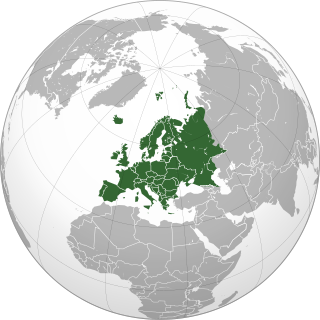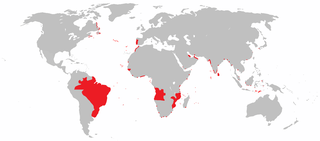
In history, a colony is a territory under the immediate complete political control and occupied by settlers of a state, distinct from the home territory of the sovereign. For colonies in antiquity, city-states would often found their own colonies. Some colonies were historically countries, while others were territories without definite statehood from their inception.

Colonialism is the policy of a nation seeking to extend or retain its authority over other people or territories, generally with the aim of economic dominance. The colonising country seeks to benefit from the colonised country or land mass. In the process, colonisers impose their religion, economics, and medicinal practices on the natives. Colonialism is the relationship of domination of indigenous by foreign invaders where the latter rule in pursuit of their interests.

Imperialism is a policy or ideology of extending a country's rule over foreign nations, often by military force or by gaining political and economic control of other areas. Imperialism was both normal and common worldwide throughout recorded history, the earliest examples dating from the mid-third millennium BC. In recent times, it has been considered morally reprehensible and prohibited by international law. Therefore, the term is used in international propaganda to denounce an opponent's foreign policy.

Western imperialism in Asia as presented in this article pertains to Western European entry into what was first called the East Indies. This was sparked early in the 15th century by the search for trade routes to China that led directly to the Age of Discovery, and the introduction of early modern warfare into what was then called the Far East. By the early 16th century the Age of Sail greatly expanded Western European influence and development of the Spice Trade under colonialism. There has been a presence of Western European colonial empires and imperialism in Asia throughout six centuries of colonialism, formally ending with the independence of the Portuguese Empire's last colony East Timor in 2002. The empires introduced Western concepts of nation and the multinational state. This article attempts to outline the consequent development of the Western concept of the nation state.

Hegemony is the political, economic, or military predominance or control of one state over others. In ancient Greece, hegemony denoted the politico-military dominance of a city-state over other city-states. The dominant state is known as the hegemon. In the 19th century, hegemony came to denote the "Social or cultural predominance or ascendancy; predominance by one group within a society or milieu". Later, it could be used to mean "a group or regime which exerts undue influence within a society". Also, it could be used for the geopolitical and the cultural predominance of one country over others, from which was derived hegemonism, as in the idea that the Great Powers meant to establish European hegemony over Asia and Africa.

In historical contexts, New Imperialism characterizes a period of colonial expansion by European powers, the United States, and Japan during the late 19th and early 20th centuries. The period featured an unprecedented pursuit of overseas territorial acquisitions. At the time, states focused on building their empires with new technological advances and developments, expanding their territory through conquest, and exploiting the resources of the subjugated countries. During the era of New Imperialism, the Western powers individually conquered almost all of Africa and parts of Asia. The new wave of imperialism reflected ongoing rivalries among the great powers, the economic desire for new resources and markets, and a "civilizing mission" ethos. Many of the colonies established during this era gained independence during the era of decolonization that followed World War II.

Pax Britannica was the period of relative peace between the Great Powers during which the British Empire became the global hegemonic power and adopted the role of a "global policeman".

American imperialism describes policies aimed at extending the political, economic, and cultural control of the United States over areas beyond its boundaries. Depending on the commentator, it may include military conquest, gunboat diplomacy, unequal treaties, subsidization of preferred factions, economic penetration through private companies followed by intervention when those interests are threatened, or regime change.

The French colonial empire constituted the overseas colonies, protectorates and mandate territories that came under French rule from the 16th century onward. A distinction is generally made between the "first colonial empire," that existed until 1814, by which time most of it had been lost, and the "second colonial empire", which began with the conquest of Algiers in 1830. The second colonial empire came to an end after the loss in later wars of Indochina (1954) and Algeria (1962), and relatively peaceful decolonizations elsewhere after 1960.

The Scramble for Africa, also called the Partition of Africa or the Conquest of Africa, was the invasion, occupation, division, and colonisation of African territory by European powers during the period known to historians as the New Imperialism. In 1870, only 10 percent of Africa was under formal European control; by 1914 it had increased to almost 90 percent of the continent, with only Ethiopia (Abyssinia), the Dervish state and Liberia still being independent. There were multiple motivations for European colonizers, including desire for valuable resources available throughout the continent, the quest for national prestige, tensions between pairs of European powers, religious missionary zeal and internal African native politics.

The Berlin Conference of 1884–85, also known as the Congo Conference or West Africa Conference, regulated European colonization and trade in Africa during the New Imperialism period and coincided with Germany's sudden emergence as an imperial power. The conference was organized by Otto von Bismarck, first Chancellor of Germany; its outcome, the General Act of the Berlin Conference, can be seen as the formalisation of the Scramble for Africa, although some scholars of history warn against an overemphasis of its role in the colonial partitioning of Africa, drawing attention to bilateral agreements concluded before and after the conference. The conference ushered in a period of heightened colonial activity by European powers, which eliminated or overrode most existing forms of African autonomy and self-governance.
Decolonization or Decolonisation is the undoing of colonialism, the latter being the process whereby a nation establishes and maintains its domination on overseas territories. The concept particularly applies to the dismantlement, during the second half of the 20th century, of the colonial empires established prior to World War I throughout the world. Scholars focus especially on the movements in the colonies demanding independence, such as Creole nationalism.

The Dutch colonial empire comprised the overseas territories and trading posts controlled and administered by Dutch chartered companies and subsequently by the Dutch Republic (1581–1795), and by the modern Kingdom of the Netherlands after 1815. It was initially a trade-based system which derived most of its influence from merchant enterprise and from Dutch control of international maritime shipping routes through strategically placed outposts, rather than from expansive territorial ventures. With a few notable exceptions, the majority of the Dutch colonial empire's overseas holdings consisted of coastal forts, factories, and port settlements with varying degrees of incorporation of their hinterlands and surrounding regions. Dutch chartered companies often dictated that their possessions be kept as confined as possible in order to avoid unnecessary expense, and while some such as the Dutch Cape Colony and Dutch East Indies expanded anyway, others remained undeveloped, isolated trading centres dependent on an indigenous host-nation. This reflected the primary purpose of the Dutch colonial empire: commercial exchange as opposed to sovereignty over homogeneous landmasses.
A colonial empire is a collective of territories, either contiguous with the imperial center or located overseas, settled by the population of a certain state and governed by that state.

Western civilization traces its roots back to Europe and the Mediterranean. It is linked to the Roman Empire and with Medieval Western Christendom which emerged from the Middle Ages to experience such transformative episodes as the Renaissance, the Reformation, the Enlightenment, the Industrial Revolution, scientific revolution, and the development of liberal democracy. The civilizations of Classical Greece and Ancient Rome are considered seminal periods in Western history; a few cultural contributions also emerged from the pagan peoples of pre-Christian Europe, such as the Celts and Germans, as well as some significant religious contributions derived from Judaism and Hellenistic Judaism stemming back to Second Temple Judea, Galilee, and the early Jewish diaspora; and some other Middle Eastern influences. Christianity and Roman Catholicism has played a prominent role in the shaping of Western civilization, which throughout most of its history, has been nearly equivalent to Christian culture.. Western civilization has spread to produce the dominant cultures of modern Americas and Oceania, and has had immense global influence in recent centuries in many ways.

The historical phenomenon of colonization is one that stretches around the globe and across time. Modern state global colonialism, or imperialism, began in the 15th century with the "Age of Discovery", led by Portuguese, and then by the Spanish exploration of the Americas, the coasts of Africa, the Middle East, India and East Asia. The Portuguese and Spanish empires were the first global empires because they were the first to stretch across different continents, covering vast territories around the globe. In 1492, notable Genoese (Italian) explorer Christopher Columbus and his Castilian (Spanish) crew discovered the Americas for the Crown of Castile. The phrase "the empire on which the sun never sets" was first used for the Spanish Empire in the 16th century. During the late 16th and 17th centuries, England, France and the Dutch Republic also established their own overseas empires, in direct competition with each other.

The history of external colonisation of Africa can be dated from ancient, medieval, or modern history, depending on how the term colonisation is defined. In popular parlance, discussions of colonialism in Africa usually focus on the European conquests that culminated in the era of New Imperialism and the Scramble for Africa (1884-1914), followed by gradual decolonisation. The principal powers involved in the modern colonisation of Africa are Britain, France, Germany, Portugal, and Italy. In nearly all African countries today, the language used in government and media is the one imposed by a recent colonial power.
This Timeline of European imperialism covers episodes of imperialism by western nations since 1400 but does not take into account imperialism by other nations such as the Inca, the Chinese Empire or Japanese Imperialism, to give only a few of many examples. As such, readers may wish to treat it with some caution if using it as a resource to understand the complete phenomena of imperialism and colonialism.




















